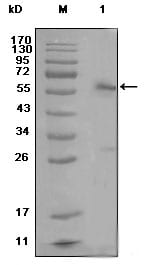
| WB | 1/500 - 1/2000 | Human,Mouse,Rat |
| IF | 咨询技术 | Human,Mouse,Rat |
| IHC | 咨询技术 | Human,Mouse,Rat |
| ICC | 技术咨询 | Human,Mouse,Rat |
| FCM | 咨询技术 | Human,Mouse,Rat |
| Elisa | 1/10000 | Human,Mouse,Rat |
| Aliases | ER; ESR; Era; ESRA; NR3A1 |
| Entrez GeneID | 2099 |
| clone | 2G112B3 |
| Host/Isotype | Mouse IgG1 |
| Antibody Type | Primary antibody |
| Storage | Store at 4°C short term. Aliquot and store at -20°C long term. Avoid freeze/thaw cycles. |
| Species Reactivity | Human |
| Immunogen | Synthetic peptide corresponding to aa(SLQKYYITGEAEGFPATVc) of human ESR1, conjugated to KLH. |
| Formulation | Ascitic fluid containing 0.03% sodium azide. |
+ +
以下是关于ESR1抗体的3篇参考文献及其摘要概括:
---
1. **文献名称**:*"Immunohistochemical Detection of Estrogen Receptor Alpha in Breast Cancer: Comparison of Antibody Clones and Methods"*
**作者**:Allred DC, Harvey JM, Berardo M, et al.
**摘要**:该研究比较了不同ESR1抗体克隆(如1D5和6F11)在乳腺癌组织免疫组化检测中的性能,发现抗体选择及预处理方法显著影响结果准确性,强调了标准化检测流程对临床诊断的重要性。
2. **文献名称**:*"Characterization of a Novel Monoclonal Antibody Specific for Estrogen Receptor Alpha (ESR1) for Diagnostic Applications"*
**作者**:Mohammed H, Russell IA, Stark R, et al.
**摘要**:作者开发并验证了一种高特异性的ESR1单克隆抗体,通过质谱和染色一致性分析证明其在福尔马林固定组织中的可靠性,为乳腺癌分子分型提供了新工具。
3. **文献名称**:*"ESR1 Mutations and Antibody Cross-Reactivity in Endocrine-Resistant Metastatic Breast Cancer"*
**作者**:Jeselsohn R, Buchwalter G, De Angelis C, et al.
**摘要**:该研究探讨了ESR1基因突变(如Y537S)是否影响临床抗体检测,发现部分突变会导致假阴性结果,提示需优化抗体设计以提高对突变受体的识别能力。
---
这些文献覆盖了抗体性能比较、开发验证及临床应用中突变影响等方向,可为ESR1检测方法优化提供参考。
**Background of ESR1 Antibodies**
ESR1 (Estrogen Receptor Alpha) is a nuclear hormone receptor encoded by the *ESR1* gene, playing a critical role in mediating estrogen signaling. It regulates gene expression by binding to estrogen-responsive DNA elements, influencing cell proliferation, differentiation, and survival. ESR1 is structurally composed of ligand-binding (LBD), DNA-binding (DBD), and activation function (AF-1/AF-2) domains, enabling hormone-dependent and -independent transcriptional activity.
In clinical contexts, ESR1 is a key biomarker in breast cancer, with approximately 70% of cases classified as estrogen receptor-positive (ER+). ESR1 antibodies are widely used in immunohistochemistry (IHC) to detect ER expression, guiding therapeutic decisions (e.g., endocrine therapies like tamoxifen or aromatase inhibitors). Aberrant ESR1 signaling, including mutations (e.g., Y537S, D538G) or ligand-independent activation, contributes to endocrine resistance in metastatic breast cancer, necessitating ESR1-targeted research.
ESR1 antibodies also serve as essential tools in research to study receptor localization, post-translational modifications (e.g., phosphorylation), and interactions with co-regulators or signaling pathways (e.g., MAPK, PI3K). Additionally, they aid in exploring ESR1's role in non-cancer contexts, such as cardiovascular or bone metabolism. Recent advancements include developing antibodies specific to mutant ESR1 variants to improve diagnostic and therapeutic precision.
Overall, ESR1 antibodies bridge basic research and clinical applications, enhancing understanding of estrogen signaling and advancing targeted cancer therapies.
×